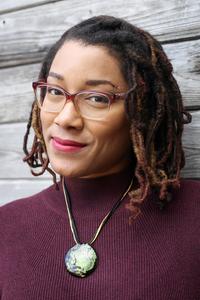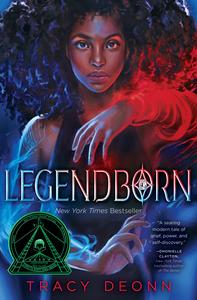 Tracy Deonn grew up in central North Carolina, where she devoured fantasy books and Southern food in equal measure. After earning her master's degree in communication and performance studies from the University of North Carolina at Chapel Hill, she worked in live theater, video game production and K-12 education. Earlier this week, Deonn won the CSK/John Steptoe Award for New Talent for her debut YA novel, Legendborn, published by Margaret K. McElderry Books.
Tracy Deonn grew up in central North Carolina, where she devoured fantasy books and Southern food in equal measure. After earning her master's degree in communication and performance studies from the University of North Carolina at Chapel Hill, she worked in live theater, video game production and K-12 education. Earlier this week, Deonn won the CSK/John Steptoe Award for New Talent for her debut YA novel, Legendborn, published by Margaret K. McElderry Books.
It's terribly exciting to win the CSK/John Steptoe--how are you feeling?
Feeling absolutely incredible! I keep thinking of these three words: "Honored. Affirmed. Emboldened." Legendborn was truly born from such a personal place that working on it always made me feel both exhilarated and vulnerable. I wrote the book I always wanted to read and tried things, from a craft and genre standpoint, that I'd never seen before. This recognition feels like an acknowledgement of not just the work I put into the novel, but the work the novel itself can do out in the world. I'm very proud of myself and the editorial team who helped bring Legendborn to life, and I feel emboldened to take risks and keep writing stories that exhilarate me.
 The concept of Legendborn is utterly entertaining--a contemporary Black and Southern twist on Arthurian legend. What inspired this book?
The concept of Legendborn is utterly entertaining--a contemporary Black and Southern twist on Arthurian legend. What inspired this book?
The first kernel of Legendborn was born when I lost my mother. At that time, I learned that she had lost her mother at the same age that I lost her, and that the same had occurred with my grandmother and great-grandmother--a strange pattern with no explanation. I was raised on science fiction and fantasy, so I immediately began to imagine a girl who could go on an epic, magical journey to find out why her mother died. That girl became Bree and that journey is the core of Legendborn.
Sometimes people ask if I was inspired by King Arthur, but Arthur actually came up later on as I explored ideas about grief and loss and legacy, when I started asking "Whose lives and losses get forgotten and go unexplained, and whose lives and losses become legendary?" Arthur came up pretty naturally for me as one of our oldest collective legends. Living in the South most of my life, I know that same question is in the air we breathe: "Whose lives do we memorialize?" So, North Carolina was the perfect place to support this story.
How did you create this consistent and coherent magical world?
Solid magic systems are very fun to create! I adore them as a reader, and I dedicated close to 18 months designing and stress-testing Legendborn's hard magic system. ("Hard" meaning it has strict rules.) I had two main goals for the magic of the book. The first goal was that, as a contemporary fantasy, the magic needed to feel believable and real. That meant I had to come up with ways to keep magic hidden from normal everyday humans, create consequences for its use and develop specific limitations on each type of power. The second goal was that, as a story set in a world where King Arthur and the Round Table really existed, I needed to create a magic system that would believably allow their descendants to hold power via bloodlines 1,500 years later. To do this, I spent a long time mapping out bloodlines and generations, and designed rules that would allow these "Legendborn" kids to realistically keep a magical war going in the modern day. The Arthurian literary tradition is actually based on authors taking parts of prior Arthurian stories from centuries past and reworking them in new ways. I followed that tradition and selected the legends and concepts that most supported the story I wanted to tell.
What do you hope readers take from Legendborn?
I hope that readers walk away with a more inclusive understanding of grief, because it isn't just one thing. Grief is a constellation of emotions, some traumatic, and healing doesn't have to look like "getting over" all of that. Sometimes healing means integration. I hope that the book invites readers to look at the body of work that we call Arthurian legend, as well as other legends, and wonder whose stories are going untold and why.
What are you working on now?
I'm working on the sequel to Legendborn, which is both exciting and challenging! I'm also working on early concepts for a couple of short stories and a fandom project or two.
Is there anything else you'd like to tell Shelf Awareness readers?
I wanted to fully explore contemporary fantasy by holding myself and the book accountable to both the contemporary and the fantasy sides of the subgenre. I needed to write a book that could challenge systems of power, whether that's magical power or real colonial violence or tools of racial and gender oppression. Winning the Steptoe feels like a huge win not just for me and this book, but for fantasy as a genre and Black American fantasy in particular. I definitely feel connected to the lineage of Black authors before me who have pushed at the boundaries of the speculative as a form of real-world resistance. --Siân Gaetano, children's and YA editor, Shelf Awareness

